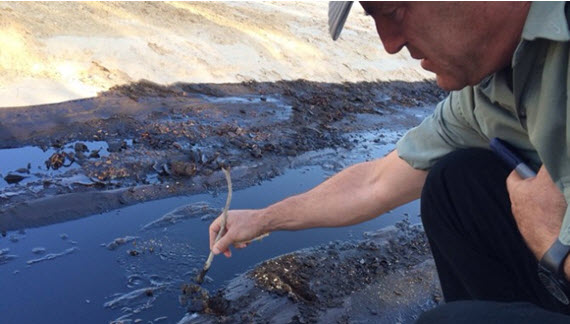The crude oil spill in southern Israel’s Arava desert is three to five times as bad as was originally estimated. According to the daily newspaper Haaretz, on Sunday night, December 7, the company responsible for the pipeline acknowledged that the “volume of crude oil that spilled into the Arava Desert last week is 60 percent larger” than the amount previously reported. When the spill initially occurred from the pipeline under repair on Thursday, December 4, the Eilat-Ashkelon Pipeline Company (EAPC) reported that between one and 1.5 million liters of crude oil had contaminated the Arava, but later revised its calculation to three million liters. However, the latest report issued by the company on Sunday puts the quantity of spilled crude at some five million liters. The oil spill, which occurred near the town of Be’er Ora approximately 20 kilometers north of Eilat, has badly damaged the Evrona Nature Reserve.

Five million liters of crude oil spilled out of the pipeline being repaired by the Eilat-Ashkelon Pipeline Company and badly damaged the Evrona Nature Reserve. (Photo: Environmental Protection Ministry)
On Tuesday, December 9, the Environmental Protection Ministry said that, despite the rainfall in the southern Arava region, the crude oil has not spread beyond the area already contaminated. According to the ministry, crews have been working to build dams and lay out absorbent material adjacent to the drainage openings at the northern point of the Gulf of Eilat to prevent the oil from reaching the Red Sea. “So far, 20,000 tons of contaminated soil and most of the spilled oil have been removed from the Evrona Nature Reserve and other parts of the Arava,” a spokesperson for the ministry said. However, despite these efforts, flora and fauna in the region have been harmed. Experts have found 430 damaged acacia trees.
At a Knesset hearing, MK Dov Khenin (Hadash), chairman of the Social-Environmental Lobby, said that the accident could have been averted. “We warned, here in this very committee, of a possible oil spill disaster, and all of our warnings ended up occurring. This should never have happened. We will demand explanations and answers and will call here all relevant parties so we can understand exactly what happened and how it happened,” he said. According to MK Khenin, Israel’s extreme right-wing, neo-liberal government repeatedly rejected legislation to place more up-to-date environmental monitoring and enforcement rules in effect. “The entire issue of EAPC requires much more serious supervision and control,” he said.
On Tuesday morning, Raviv Shapira, deputy director-general of the Israel Nature and Parks Authority, told IDF Radio that the rehabilitation of the nature reserve could take years. “The operation will take at least a year because the polluted area is enormous – fuel flowed through all the river beds [which altogether are] six kilometers long and one kilometer wide,” he said. “Only in a year’s time will we know what the total damage is and only after a ‘few good years’ will we know what we will be able to recover,” he added.


